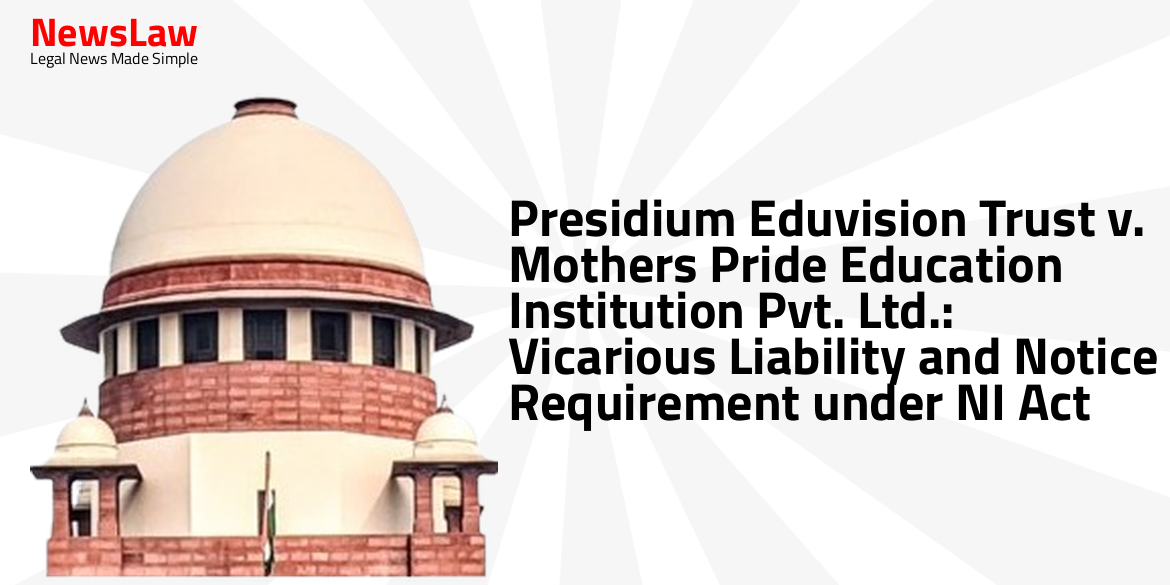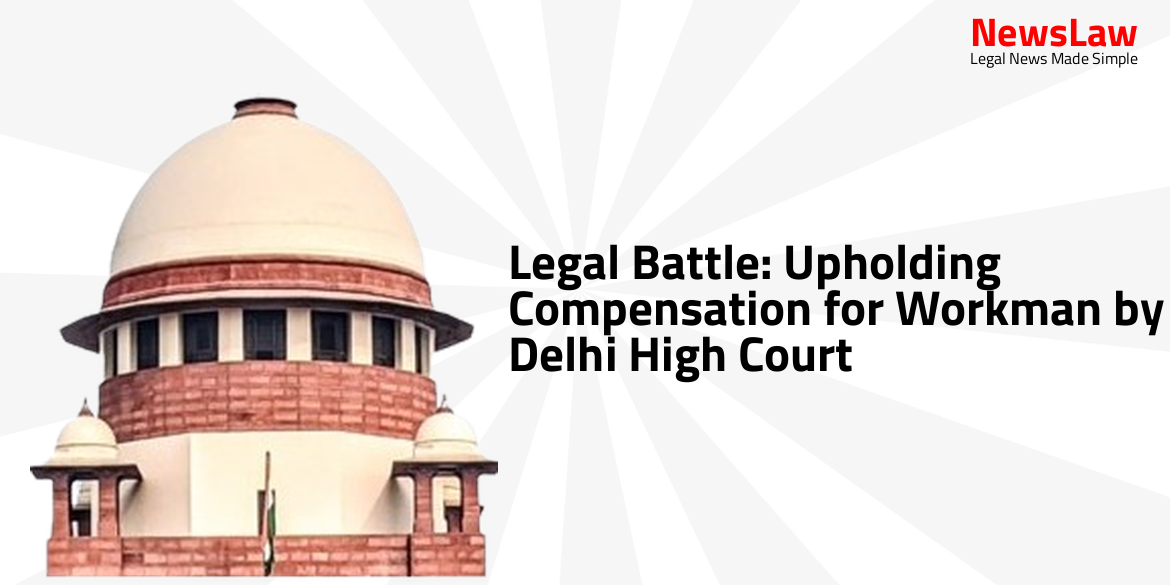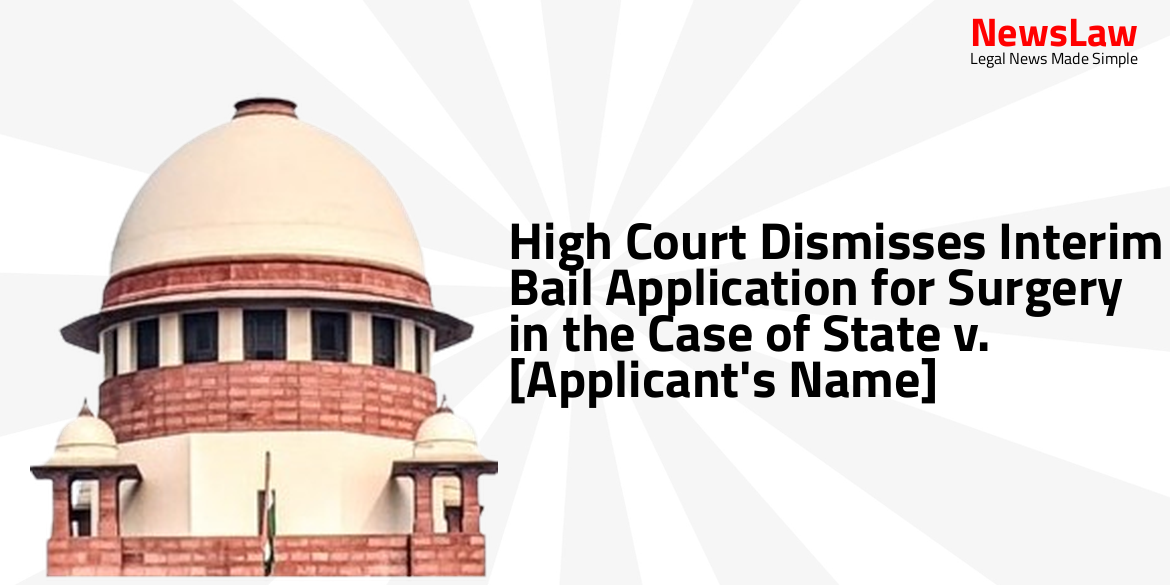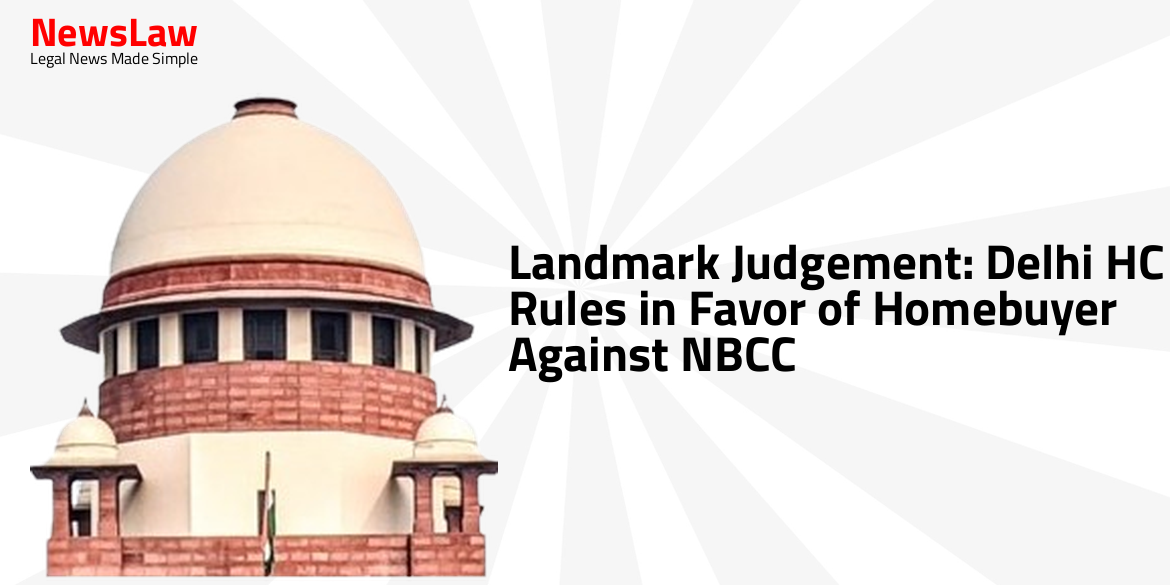The Delhi High Court recently rendered a significant judgment in the case of Presidium Eduvision Trust v. Mothers Pride Education Institution Pvt. Ltd. The judgment explores the concept of vicarious liability and the notice requirement under the NI Act. It delves into the responsibilities of trustees and directors in cases of alleged fraudulent transactions, shedding light on legal intricacies surrounding financial frauds and company liabilities.
Facts
- Accused nos. 1 to 10 induced the complainant with false assurances and representations to enter into the transaction and extend the loan facility.
- Accused’s intentions were malafide from the beginning and the complainant was cheated.
- Accused nos. 1 and 2 are being managed by Mothers Pride Education Institution Pvt. Ltd., while accused nos. 3 to 10 are involved in handling the day-to-day affairs and business of the accused.
- Accused nos. 3 to 10 personally convinced the complainant to enter into the transaction.
- Accused nos. 1-10 are responsible for cheating the complainant with malafide intentions and causing significant wrongful losses by making false representations.
- The Presidium Eduvision Trust was represented as the senior wing of Mothers Pride Education Institution for school-going kids.
- Accused nos. 1 to 10 falsely and dishonestly assured the complainant about the repayment of the loan amount via cheques.
Arguments
- The petitioners argue that the complaints against them are not maintainable and they cannot be summoned.
- They assert that the service of notice under Proviso (b) to Section 138 of the NI Act on the accused is mandatory for the complaint’s maintainability.
- They rely on judgments of various courts to support their argument regarding the necessity of serving the notice on the accused.
- The respondent claims that serving the notice on the Trust through its Trustees fulfills the requirement of Proviso (b) to Section 138 of the NI Act.
- The Trial Court allowed the application to summon the petitioners as accused in the Complaint Cases filed by the respondent(s), leading to the filing of the present petitions by the petitioners.
- The counsel for the Respondent argues that the Trustees of the accused Trust were not aware of their status when dealing with the petitioners.
- Notice addressed to the Trust through its Trustees is considered sufficient for notifying the Trustees in their individual capacity.
- Counsel relies on the Supreme Court judgments in Kirshna Texport & Capital Markets Ltd. v. Ila A. Agrawal & Ors. (2015) 8 SCC 28 and Hardeep Singh v. State of Punjab & Ors. (2014) 3 SCC 92 to support the argument that Section 319 of the Cr. P.C. is to ensure the real culprits are not spared.
- The petitioners, as Trustees of the accused Trust, can be proceeded against under Section 141 of the NI Act.
- The purpose of Section 319 of the Cr. P.C. is emphasized to address situations where individuals like the petitioners are discovered to be involved.
- Citing the judgment of the High Court of Madras in Abraham Memorial Educational Trust v. C. Suresh Babu, it is argued that all Trustees of a Trust are equally liable under Section 141 of the NI Act.
- Merely amending the complaints to include the petitioners and changing the accused number is deemed insufficient to satisfy the requirements of Section 141 of the NI Act.
- It is argued that the Complaint Cases against the petitioners should be dismissed as the respondent was not aware of the Trustees until later in the process.
- The Trust was issued a legal/demand notice to be served through its Trustees.
Analysis
- For the maintainability of a complaint under Section 138 of the NI Act, the payee or holder must give a written demand to the drawer within 30 days of receiving information of the cheque bouncing.
- Conditions for the offence under Section 138 are stipulated in the proviso to the section.
- If an offence is committed by a company under the NI Act, directors, managers, or officers deemed guilty if proved to be with their consent or neglect.
- Section 141 states that individuals responsible for the conduct of a company’s business are deemed guilty if the offence is committed by the company.
- Offences committed by companies under Section 138 of the NI Act make directors liable if they were in charge of the company at the time of the offence.
- The judgment emphasizes that Trustees of a Trust can be deemed responsible for the conduct of the Trust’s business under Section 138 of the NI Act.
- The lack of notice under Proviso (b) to Section 138 is a key argument by the counsel for the petitioners, but the court finds no merit in this claim.
- The judgment clarifies that notice under Section 138 is required to be sent to the ‘drawer’ of the cheque, which in this case is the accused no.2 Trust.
- The Trustees of the accused no.2 Trust, including accused nos. 9, 11, and 12, being in charge of the Trust’s affairs, are held liable under Section 141 of the NI Act.
- The court rejects the necessity of issuing individual notices to Directors of the Company in addition to the notice served to the Company itself under Section 138.
- It is explained that the notice to the Company is sufficient as Directors running the Company should naturally be aware of it.
- The court highlights the purpose of creating vicarious liability under Section 141, stating that those responsible for guiding the actions of a company must be held accountable.
- The judgment stresses that the opportunity given to the ‘drawer’ Company under Section 138 is adequate for Directors who are in charge of the Company.
- The ruling in the judgment is supported by precedent judgments that uphold the interpretation of Section 138 concerning notice and vicarious liability of Company Trustees.
- The court concludes that all Trustees of accused no.2 Trust are deemed to have received the legal/demand notice(s) sent to the Trust, meeting the requirements of Proviso (b) to Section 138 of the NI Act.
- Notice in the present Complaint Cases has been sent to the drawer, i.e., the accused no.2-Trust.
- The Supreme Court considered Proviso (b), Section 141, and Section 7 of the NI Act.
- The interpretation of these provisions was crucial to the case.
- The Supreme Court deliberated on the implications of these provisions for the case at hand.
Decision
- The Court has not expressed any opinion on the merits of the Complaint Cases.
- Observations made in the judgement will not prejudice the petitioners in their defence in the Complaint cases.
- The petitions have been found to have no merits.
- Pending applications have been disposed of as they are no longer relevant.
Case Title: HARPREET SAHNI & ANR. Vs. SHRICHAND HEMNANI AND ANR. (2024:DHC:3916)
Case Number: CRL.M.C.-6094/2022



